
Citizens today expect a seamless and efficient experience when interacting with government agencies. The paper trails and long wait times of the past are no longer acceptable. This is where digital transformation comes in – reshaping public services for the modern era.
A More Efficient and Accessible Government
Imagine renewing your driver’s license, applying for social benefits, or scheduling a permit inspection – all from the comfort of your couch. Digital transformation makes this a reality. Online portals, mobile apps, and user-friendly interfaces streamline processes, saving citizens time and frustration. Additionally, these services can be accessed 24/7, increasing accessibility for everyone.
Empowering Citizens with Data and Transparency
Data is king in the digital age. Public services can leverage data analytics to gain valuable insights into citizen needs and service usage. This allows governments to:
- Allocate resources more effectively
- Identify areas for improvement
- Develop targeted programs and initiatives
Furthermore, open data platforms can empower citizens by making government data readily available. This fosters transparency, builds trust, and allows for greater citizen participation.
Improved Communication and Engagement
Gone are the days of impersonal phone calls and endless emails. Digital tools like chatbots and social media platforms offer new avenues for communication. Citizens can get real-time updates, ask questions, and receive personalized assistance – all through their preferred channels. This two-way communication fosters a more engaged and informed citizenry.
Delivering Personalized Services
A one-size-fits-all approach doesn’t work in the digital world. Public services are embracing personalization to better serve individual needs. Imagine receiving targeted social program information or healthcare resources based on your unique circumstances. This level of personalization can significantly improve the effectiveness and impact of government services.
Challenges and Considerations
While the benefits are undeniable, digital transformation in the public sector comes with challenges. Ensuring equitable access to technology, addressing cybersecurity threats, and protecting citizen data privacy are all crucial considerations.
The Road Ahead
The digital transformation of public services is not a destination, but a continuous journey. By embracing new technologies, prioritizing citizen needs, and fostering a culture of innovation, governments can build a brighter future – one where public services are efficient, accessible, and truly responsive to the needs of the 21st century.
